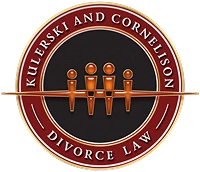
Collaborative Divorce Attorney in DuPage County, Illinois
Divorce does not have to be hostile, drawn out, or decided in a courtroom. Many couples want to separate in a way that protects their children, preserves dignity, and keeps control over important decisions. Collaborative divorce offers an alternative that prioritizes cooperation, transparency, and respect.
At Kulerski & Cornelison, attorney Kari Cornelison helps clients throughout DuPage County pursue divorce through a constructive and solution-focused process. With more than twenty years of experience in Illinois family law, she guides individuals and families through collaborative divorce with an emphasis on communication, efficiency, and long-term stability.
Need Help Now?
What Is Collaborative Divorce?
Collaborative divorce is a structured legal process in which both spouses and their attorneys work together to reach a full settlement without going to court. Instead of preparing for litigation, everyone involved commits from the outset to resolving all issues through cooperation and problem-solving.
A key feature of collaborative divorce is the participation agreement. Both spouses and their attorneys agree that if the process breaks down and litigation becomes necessary, the attorneys must withdraw and new counsel must be retained. This requirement ensures that everyone remains fully invested in reaching a peaceful resolution.
Collaborative divorce is often well suited for couples who want to:
- Maintain control over decisions affecting their family
- Avoid the stress and expense of litigation
- Protect children from conflict
- Preserve privacy and dignity
How the Collaborative Divorce Process Works in Illinois
A collaborative divorce proceeds through a series of structured meetings rather than court hearings. Each spouse is represented by an attorney trained in collaborative law who provides legal guidance while supporting a cooperative process.
The process typically includes:
- Voluntary exchange of complete financial information
- Joint meetings to identify goals and concerns
- Open discussion of options for resolving disputes
- Problem-solving focused on fairness rather than leverage
Depending on the needs of the family, neutral professionals may be brought in to support the process. These may include financial specialists, parenting coordinators, or mental health professionals who help address specific issues such as child-focused planning or complex financial decisions.
Once agreements are reached, the attorneys prepare a written settlement that is submitted to the court for approval, finalizing the divorce without contested hearings.
Benefits of Collaborative Divorce for DuPage County Families
Collaborative divorce offers meaningful advantages for couples who want to approach separation with intention and care.
Common benefits include:
- A faster process with fewer court delays
- Lower overall costs compared to contested divorce
- Reduced emotional strain for spouses and children
- Greater privacy, as negotiations remain confidential
- Solutions tailored to the family rather than imposed by a judge
Most importantly, collaborative divorce keeps decision-making power with the spouses. Rather than turning over control to the court, couples work together to design agreements that reflect their values, priorities, and future goals.
Collaborative Divorce vs. Traditional Divorce
Traditional divorce often involves formal court filings, discovery disputes, and contested hearings. This structure can increase hostility, prolong the process, and escalate costs. It may also place sensitive family matters into the public record.
Collaborative divorce takes a different approach. Instead of relying on motions and courtroom strategy, spouses meet face-to-face with their attorneys to address issues directly. The focus is on cooperation, transparency, and problem-solving rather than winning or losing.
For many DuPage County families, this approach leads to:
- More practical agreements
- Less damage to co-parenting relationships
- A smoother transition into life after divorce
When Collaborative Divorce Works Best
Collaborative divorce works best when both spouses are willing to:
- Communicate openly and honestly
- Share financial information voluntarily
- Participate in good faith
- Focus on long-term outcomes rather than short-term leverage
It is particularly effective for couples who share children and want to maintain a functional co-parenting relationship. Families who plan to continue living and raising children in the same DuPage County communities often benefit from the cooperative nature of the process.
Collaborative divorce may not be appropriate in situations involving hidden assets, refusal to participate honestly, safety concerns, or significant power imbalances. Kari Cornelison carefully evaluates each case and helps clients determine whether collaborative divorce is the right path or whether another approach would better protect their interests.
Issues Addressed Through Collaborative Divorce
Even though the process is cooperative, all legal issues must still be resolved before a divorce can be finalized. The collaborative process provides a structured and respectful environment to address these matters thoroughly.
Issues commonly resolved include:
- Division of marital property and debts
- Allocation of parental responsibilities
- Parenting time schedules
- Child support
- Spousal maintenance
Kari works closely with clients to ensure every agreement complies with Illinois law and addresses both immediate and long-term considerations. Her understanding of the Illinois Marriage and Dissolution of Marriage Act helps clients avoid future disputes and maintain stability after the divorce is complete.
Why Work With Kari Cornelison
Kari Cornelison focuses her practice exclusively on family law and brings a practical, compassionate approach to every case. She understands that most people pursuing divorce want to resolve matters efficiently, fairly, and without unnecessary hostility.
With extensive experience serving clients throughout DuPage County, Kari brings both local insight and strong problem-solving skills to the collaborative process. Her commitment to settlement-based family law allows clients to remain actively involved in shaping their outcomes while reducing the stress often associated with traditional divorce litigation.
Clients consistently describe her as responsive, supportive, and focused on helping families move forward with dignity and confidence.
Serving Clients Throughout DuPage County
From her office in Oak Brook, Kari Cornelison serves clients across DuPage County, including communities such as Naperville, Wheaton, Downers Grove, Elmhurst, Lombard, Hinsdale, Clarendon Hills, and surrounding areas. Her exclusive focus on family law allows her to deliver knowledgeable and personalized representation in every case.
Contact Kulerski & Cornelison
If you are considering collaborative divorce in DuPage County, you deserve an attorney who understands how to balance efficiency, fairness, and compassion. Kari Cornelison will help you evaluate whether collaborative divorce is appropriate for your situation and guide you through every step of the process.
Contact Kulerski & Cornelison today to schedule a confidential consultation and learn how collaborative divorce can help you reach a respectful and lasting resolution.



